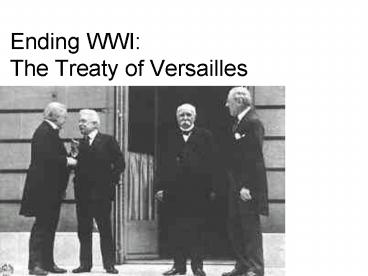Ending WWI: The Treaty of Versailles - PowerPoint PPT Presentation
1 / 14
Title:
Ending WWI: The Treaty of Versailles
Description:
She has great problems of her own to solve, very grim and perilous problems, ... Arial Calibri Times New Roman Default Design Ending WWI: ... – PowerPoint PPT presentation
Number of Views:149
Avg rating:3.0/5.0
Title: Ending WWI: The Treaty of Versailles
1
Ending WWI The Treaty of Versailles
2
Intro
- US contribution to the war effort
- War ends Nov. 11, 1918
- Effects
- Empires disappear Austro Hungarian, German,
Russian, Ottoman - Casualty rates large of workforce
- Disease Spanish Flu 50million worldwide
- Treaty of Versailles imposed on the Central
Powers - Legacy?
3
US Contribution
- First US troops shipped overseas in late 1917
- US breaks stalemate
- Troops, supplies, morale
- Economic naval contribution most significant
4
Effects of the War
Entente Powers Population Millions Military Deaths Civilian Deaths Total Deaths Military Wounded
France 39.6 1,397,800 300,000 1,697,800 4,266,000
Italy 35.6 651,010 589,000 1,240,010 953,886
Russia 158.9 1,811,000 1,500,000 3,311,000 4,950,000
Serbia 4.5 275,000 450,000 725,000 133,148
United Kingdom 45.4 885,138 109,000 994,138 1,663,435
United States 92.0 116,708 757 117,465 205,690
Austria-Hungary 51.4 1,100,000 467,000 1,567,000 3,620,000
Germany 64.9 2,036,897 426,000 2,462,897 4,247,143
Ottoman Empire 21.3 800,000 4,200,000 5,000,000 400,000
Grand Total 933.0 9,720,453 8,865,649 19,769,102 21,228,813
5
- Physical Destruction
- -vast areas of north-eastern Europe
- -Flanders Ypres, Belgium destroyed
- -750,000 French homes
- -French infrastructure
- -roads, coal mines, telegraph lines
- -agriculture
6
Wilsons 14 Points
- Moral Diplomacy argues that US foreign policy
should be defined by moral objectives the spread
of liberty, freedom, constitutionality abroad. - 14 Point plan
- Several specific territorial issues
- Recognition of the freedom of the seas
- Reduction of national armaments
- Self determination within the A-H empire
- A General association of nations for the
purpose of affording mutual guarantees of
political independence and territorial integrity
to great and small states alike
7
Treaty of VersaillesNov. 11, 1918
- The Big Four
- Britain David Lloyd George
- France Georges Clemenceau
- Italy Vittorio Orlando
- (all wanted revenge and compensation from
Germany) - US Woodrow Wilson (14 points)
8
Terms of the Treaty
- Germany disarmed, stripped of its colonies,
forced to admit war guilt, pay reparations - Europes map redrawn
- Creation of the League of Nations international
peacekeeping organization - (Article X, collective security agreement)
- German reaction
- Diktat
- November Criminals
9
(No Transcript)
10
(No Transcript)
11
The Battle for Ratification
- Requirements
- Opposition
- US membership in the League of Nations might
interfere with US sovereignty and might cause
European nations to interfere in the Western
Hemisphere (Monroe Doctrine) - Entangling alliances?
12
Opposition
- Irreconcilables
- Republican Senators who could not accept US
membership in the League (no matter what) - Reservationists
- Republican Senators who would accept the League
if certain changes were made (protecting US
sovereignty)
13
Henry Cabot Lodge Aug. 12, 1919
- Our first ideal is our country, and we see her in
the future, as in the past, giving service to all
her people and to the world. Our ideal of the
future is that she should continue to render that
service of her own free will. She has great
problems of her own to solve, very grim and
perilous problems, and a right solution, if we
can attain to it, would largely benefit mankind. - We would have our country strong to resist a
peril from the West, as she has flung back the
German menace from the East. We would not have
our politics distracted and embittered by the
dissensions of other lands. We would not have
our country's vigour exhausted or her moral force
abated, by everlasting meddling and muddling in
every quarrel, great and small, which afflicts
the world.
14
Results
- Wilsons speaking tour
- Attempt to rally public support
- Sept. 25, 1919 Wilson collapses from a stroke
- Rejection of the treaty
- Defeated in the Senate with without the
reservationist changes - US officially ends their war against Germany 1921































